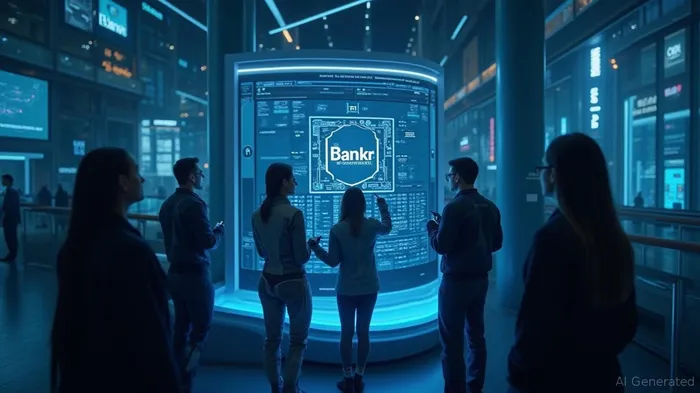Bankr Unveils API for Agent-Based Encrypted Payments to Enhance DeFi Infrastructure
Bankr, an AI agent platform, has unveiled plans to develop an API designed to facilitate agent-based encrypted payments and an information layer, marking a strategic move to enhance decentralized financial infrastructure [1]. The API aims to enable AI-driven agents to securely execute transactions while maintaining a shared information framework, potentially redefining interactions between autonomous systems and financial ecosystems. This initiative aligns with broader industry trends of integrating AI capabilities with blockchain technologies to improve data privacy and transaction efficiency. The first phase of the API will utilize BNKR tokens to process queries via x402, providing transactional data execution, while the second phase will introduce wallet creation controlled entirely by agents or apps through the Bankr platform. This development follows CoinbaseCOIN-- Ventures’ recent investment in Bankr via the Base Ecosystem Fund, which has integrated the platform into its newly launched Base app [1].
The encrypted payment functionality of Bankr’s API allows agents to process transactions without exposing sensitive data, leveraging cryptographic protocols to ensure confidentiality and integrity. The information layer, meanwhile, will enable the exchange of non-sensitive data between agents, promoting collaboration while minimizing data breach risks. This dual-layer approach addresses a critical challenge in AI and blockchain ecosystems: balancing transparency with privacy. By isolating transactional data from shared knowledge, Bankr’s API could streamline cross-agent interactions, particularly in sectors such as supply chain management or automated service networks. Industry analysts note growing demand for secure, programmable financial tools as AI agents increasingly handle complex tasks. For instance, Stripe’s focus on AI-driven fraud prevention and Fiserv’s AI strategy for payments infrastructure highlight the sector’s shift toward automation and data-driven intelligence [2][3]. Bankr’s emphasis on encryption and agent autonomy, however, differentiates it by positioning the platform as a bridge between AI and decentralized finance (DeFi).
The API’s development also intersects with broader fintech innovations, such as TransFi’s single API for stablecoin payments in Luxembourg [4]. While TransFi targets cross-border settlements, Bankr prioritizes agent-level security and interoperability, suggesting a complementary role in a diversified fintech landscape. The platform’s design may appeal to developers building applications requiring trustless collaboration, such as decentralized marketplaces or autonomous service ecosystems. However, the success of Bankr’s API hinges on adoption rates and regulatory acceptance. Integrating agent-based systems with financial protocols requires harmonizing technical standards with compliance frameworks, a challenge underscored by recent advancements in AI governance. Platforms like VerityAI, which emphasize responsible AI practices, including compliance validation, highlight the sector’s growing regulatory scrutiny [5]. Bankr’s encryption-centric model aligns with these principles but may face challenges in jurisdictions with strict data localization laws.
Long-term, the API could catalyze new business models where AI agents autonomously negotiate, execute, and settle transactions without human intervention. This mirrors Walmart’s internal initiatives to define agentic architectures for tool orchestration and dynamic routing [6], though Bankr’s encrypted payments introduce a novel dimension. If adopted widely, such systems could reduce operational costs and accelerate transaction speeds, particularly in high-volume environments. While the API’s launch timeline remains undisclosed, Bankr’s progress signals a maturing market for AI-driven financial tools. Competitors like MEXC, which have invested in decentralized AI infrastructure and data-sharing protocols [7], further underscore the competitive landscape. Bankr’s encryption-centric approach positions it as a key player in redefining financial interoperability.
Sources:
[1] BlockBeats News. (2025). AI agent platform Bankr reveals API development. https://www.theblockbeats.info/en/flash/304789
[2] MEXC. (2025). 13 public financing events, decentralized AI infrastructure. https://www.mexc.com/es/news/financing-weekly-report-13-public-financing-events-decentralized-ai-infrastructure-developer-gaia-labs-completed-20-million-in-financing-led/62500
[3] Klover.ai. (2025). Fiserv's AI Strategy: Analysis of Dominance in FinTech. https://www.klover.ai/fiserv-ai-strategy-analysis-of-dominance-in-fintech-payments-ai/
[4] TransFi. (2025). Stablecoin Payments in Luxembourg: Banking Meets Blockchain. https://www.transfi.com/blog/stablecoin-payments-in-luxembourg-banking-meets-blockchain-for-cross-border-settlements
[5] VerityAI. (2025). AI Compliance Insights & Updates. https://verityai.co/blog
[6] aijobs.net. (2025). Walmart’s agentic architecture strategy. https://aijobs.net/job/1456432-usa-principal-software-engineer/
[7] Financial. (2025). GoCardless partnership with Future Ticketing. https://financialit.net/news/payments/ego-switches-payments-7-days-saving-eu30k-month-and-boosting-app-conversions-primer?page=88

Quickly understand the history and background of various well-known coins
Latest Articles
Stay ahead of the market.
Get curated U.S. market news, insights and key dates delivered to your inbox.

Comments
No comments yet